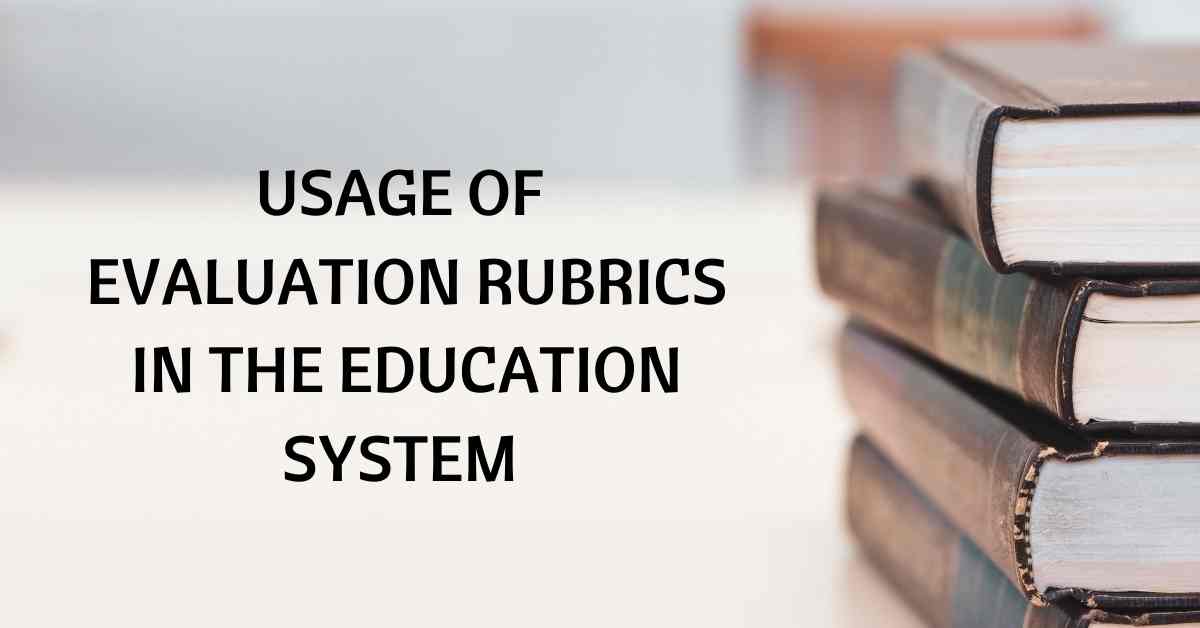
“Assessment is like an engine that drives students learning”. In this context, it is important that the engine should be flawless and perfectly tuned to a certain level of standards. A simple anecdote to depict the significance of the consolidation and tuning of the assessment tool is narrated here.
“Once three persons were assigned a task to value the worth of a tree. The first person valued that the tree is highly beneficial for it is a high yielding fruit tree. The second person was much moved by its lush and beautiful overgrowth; he valued it based on how it contributes to the serenity and natural ambience of the environment around. The third person with a materialistic eye was more attracted about the size of the trunk, which is about one meter in diameter, he estimates that it could be a good deal in the timber market”. All these three persons are right from their perspectives, moreover, they will never converge to a unique opinion. Hence consolidation of significant criteria relevant to the scenario and elimination of biasedness in the estimation process is an essential characteristic of a good evaluation system. Especially if the evaluation is about a performance-based activity then a set of exclusive traits or criteria should be formulated, this could be made possible by using an evaluation Rubrics.
A rubric is an evaluation manual used for scoring the students’ response, based on the expectation of quality around a task. A rubric includes three components:
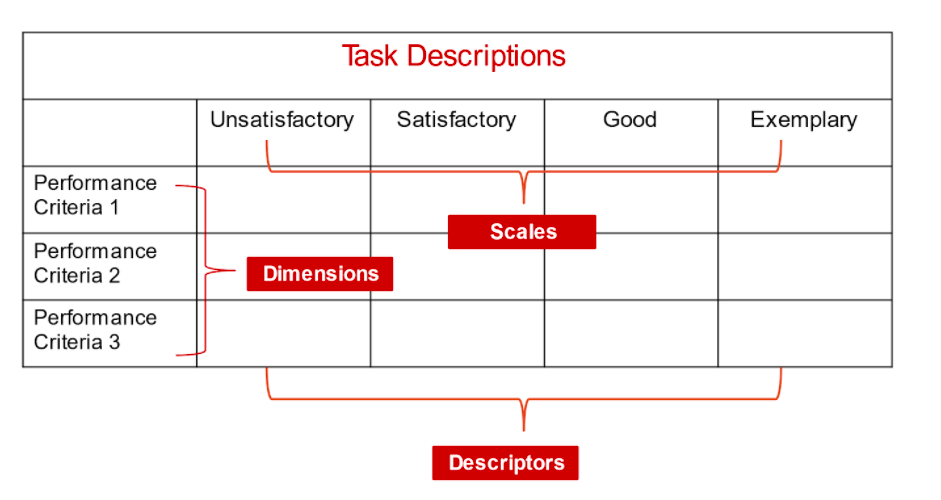
Here, a rubric will help to identify how well the students have met the criteria corresponding to the learning outcome than their respective position with respect to their peers. Thus, for an objective estimation of student’s performance using assessments tools like assignments, projects, seminars, portfolios, exams etc. it would be ideal to prepare evaluation Rubrics, based on the criteria that are significant.
Based on the type of scales adopted in the rubrics we could classify the rubrics as Checklist, Holistic rubrics and Analytic Rubrics. If we adopt a dichotomous scale like “yes or no”, “criteria met or not met” we call it as a Check List. This type of rubrics is easy to use and it will only ensure the presence of the trait or criteria. It does not give any information about the level of performance related to the criteria.
In both holistic rubrics and analytic rubrics, Likert rating scale is used to mark the level of performance of the students. The holistic rubrics is modelled in such a way that it does not differentiate the various criteria of performance, instead assigns a single score based on an overall assessment of the students work. Analytic rubric digs deep into criteria-level to project the criteria wise judgement of the student’s work. However, the score assigned to each level of performance is an ordinal scale of measurement.
Preparation of an evaluation rubrics creates clarity of focus on the assessment process and outcomes among the assessors. This will directly influence the teachers in generating the right environment for learning appropriate for the learning outcomes. It is also a good practice to share the rubrics to the students so that they remain focused on their learning process. The development of rubrics requires a deep insight into the curricular structure and the nature of activity or tools for which rubrics are developed. The sequential steps in the construction of a rubrics are detailed here.
The first stage is the review of the learning outcomes by breaking down the outcomes into component outcomes and connect it to the activities or tools for which the evaluation rubrics are developed.
The next stage is to identify the set of criteria related to the activity that addresses the component outcome under consideration.
The third stage is to develop quality statements for each criterion. These statements should be specific, observable and measurable descriptors which characteristics the expectation at each level of performance.
The fourth stage is to arrange the criteria and scale of measurement with the appropriate qualifying statement in a tabular grid. The fifth stage will be to assign a numerical score to each level of performance.
The next phase is to ensure the fairness of the rubrics with expert opinion from resource persons and by using it to evaluate the previous students’ performance. It is also a good practice to share the rubrics to the students before they involve in the assigned activity that will be assessed.
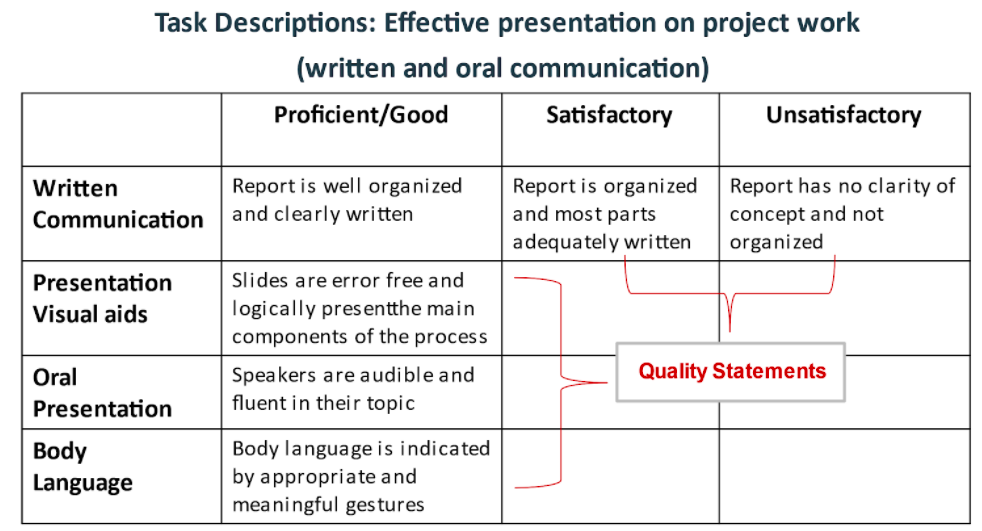
In an OBE enabled evaluation plan, the evaluation rubrics must be integrated with the outcomes – at both course level and the program level with which the activities correlate. For this, each criterion must be mapped onto the corresponding outcomes that each criterion addresses. Also, the mapping strength should be recorded in terms of high, moderate or low. This should be mentioned in a score pattern which ranges from 3 to 1. It should be presented as a matrix extension grid of various criteria to outcomes at the course level and program level as shown in the figure.
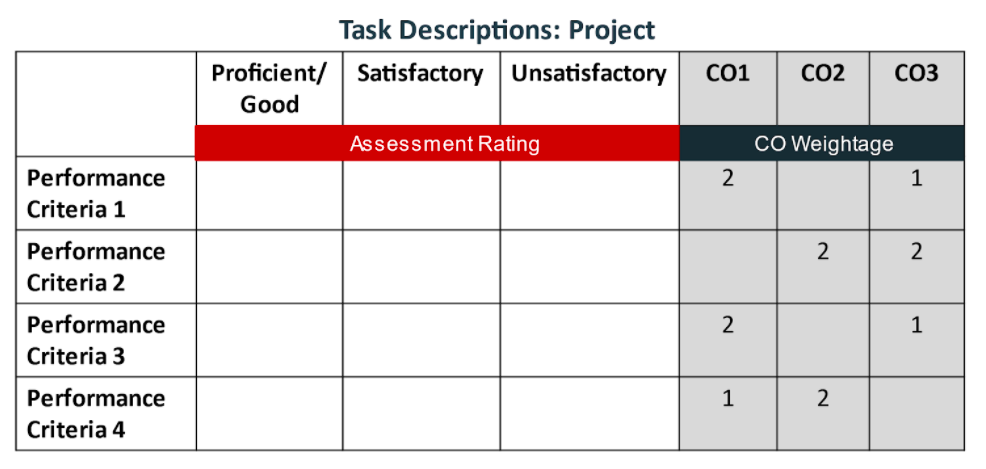
The weighted average of the attainment scores converted into a three-point scale will contribute to the score of outcome attainment with respect to the activity. These attainments could be cumulated to the Program matrix table or the course matrix table for computation of the respective course outcome or program outcome.
Development of an appropriate analytic rubrics is a skill which needs a certain level of expertise. However, there are few customizable templates available online, for easier creation of rubrics. Beginners who are not familiar with rubrics-making can work with such templates to enhance the competency level so that in further stages they could build better rubrics independently as per the requirements.
In the milieu of the new educational policy 2020, revolutionary changes are happening in the higher education system towards enhancement of quality and transformation of India to a knowledge superpower. One major focus of the transformation is the change of the education system from input-based to output-based. Consequently, there is a change in the curricular level activities from a lower-order learning process to a higher-order learning process.
In such a situation, for assessments of Higher Order Thinking Skills (HOTS), we cannot completely rely on a paper-pencil summative test. To ensure authenticity in student-level assessment, we must incorporate multi-level performance-based activities and projects. Obviously, the usage of evaluation rubrics will become mandatory in the education system. Clearly, a rubric enabled assessment scheme will safeguard objectivity and validity of the evaluation process, based on set criteria and outcomes.
Join us for FREE to get instant email updates!

In the highly competitive landscape of India’s higher education sector, […]

In education, we often ask: What should students learn? But […]

AI isn’t just knocking on the doors of education—it’s already […]
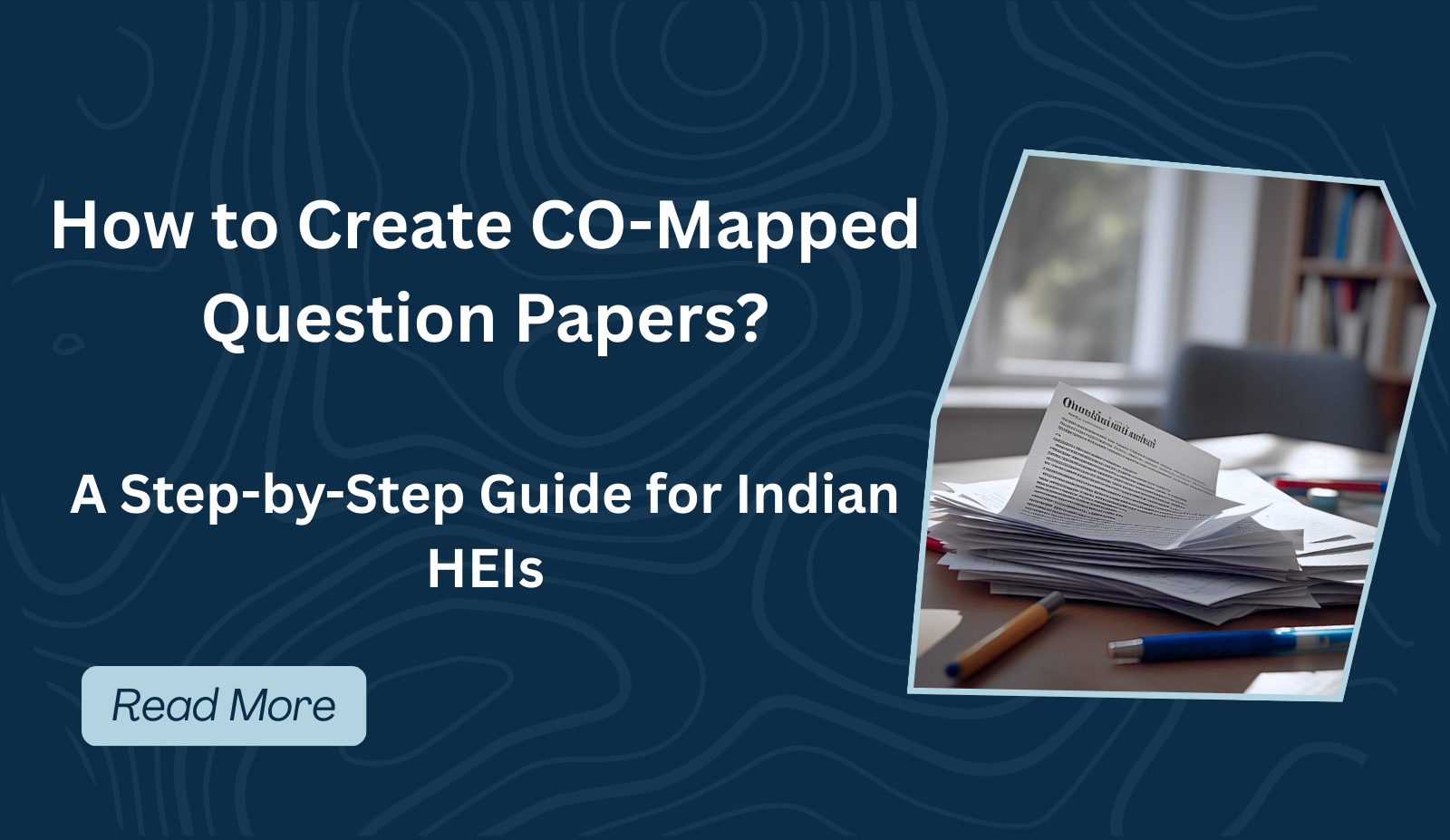
“Over 70% of faculty in Indian autonomous colleges report spending […]

For decades, India’s classrooms have followed a predictable script: students […]

A New Vision for Faculty Assessment As India’s higher education […]
Thanks for the detailed discussion of Rubrics. It is very useful to teachers
Dear George Mathew, Thanks for leaving us such wonderful feedback. We are happy that our blog was informative and valuable for you. If you have any queries feel free to contact us at academicsolutions@ipsrsolutions.com
Thank you sir. Thank you for valuable discussion, it’s very useful for every faculty
Dear Arya Rameshan, Thanks for leaving us such wonderful feedback. We are happy that our blog was informative and valuable for you. If you have any queries, feel free to contact us at academicsolutions@ipsrsolutions.com
Thank you, feel free to contact us at academicsolutions@ipsrsolutions.com
Well researched aspects about the concept of rubrics
Dear Parvathi S Shaji, Thanks for leaving us such wonderful feedback. We are happy that our blog was informative and valuable for you. If you have any queries, feel free to contact us at academicsolutions@ipsrsolutions.com
Thanks for the detailed discussion of Rubrics
Dear Mohammad Hasheer, Thanks for leaving us such wonderful feedback. We are happy that our blog was informative and valuable for you. If you have any queries, feel free to contact us at academicsolutions@ipsrsolutions.com
Thanks for the detailed discussion and its very useful
Dear Geena Jose, Thanks for leaving us such wonderful feedback. We are happy that our blog was informative and valuable for you. If you have any queries, feel free to contact us at academicsolutions@ipsrsolutions.com
Thank you, feel free to contact us at academicsolutions@ipsrsolutions.com
Valuable & Good information on Rubrics
Dear J.V.Satyanarayana, Thanks for leaving us such wonderful feedback. We are happy that our blog was informative and valuable for you. If you have any queries, feel free to contact us at academicsolutions@ipsrsolutions.com
Do all rubrics need to be evaluated for all the experiments in practical courses? Is it really possible.
Dear Dr.K.Swarnasri, Thanks for leaving us such wonderful feedback. We are happy that our blog was informative and valuable for you. If you have any queries, feel free to contact us at academicsolutions@ipsrsolutions.com
Thank for the description about rubrics.
Dear Thalluru Suneetha, Thanks for leaving us such wonderful feedback. We are happy that our blog was informative and valuable for you. If you have any queries, feel free to contact us at academicsolutions@ipsrsolutions.com
Thank You, for your feedback as our blog was informative and valuable for you.
Very informative
Dear Manju Mukundan, Thanks for leaving us such wonderful feedback. We are happy that our blog was informative and valuable for you. If you have any queries, feel free to contact us at academicsolutions@ipsrsolutions.com
Thank You, for your feedback as our blog was informative and valuable for you.
very useful content.
Dear M.Periyasamy, Thanks for leaving us such wonderful feedback. We are happy that our blog was informative and valuable for you. If you have any queries, feel free to contact us at academicsolutions@ipsrsolutions.com
Very Useful
Dear Dr J. Papeetha, Thanks for leaving us such wonderful feedback. We are happy that our blog was informative and valuable for you. If you have any queries, feel free to contact us at academicsolutions@ipsrsolutions.com
Thank you, feel free to contact us at academicsolutions@ipsrsolutions.com
THANK YOU FOR OBE INFORMATIOM
Dear SREEKALA A T, Thanks for leaving us such wonderful feedback. We are happy that our blog was informative and valuable for you. If you have any queries, feel free to contact us at academicsolutions@ipsrsolutions.com
Thank you
Thank you, feel free to contact us at academicsolutions@ipsrsolutions.com
Thank you
Dear Neethu Ann Georgie, Thanks for leaving us such wonderful feedback. We are happy that our blog was informative and valuable for you. If you have any queries, feel free to contact us at academicsolutions@ipsrsolutions.com
Very informative.
Thank you, feel free to contact us at academicsolutions@ipsrsolutions.com
Very informative materials.
Dear Mahesh T R, Thanks for leaving us such wonderful feedback. We are happy that our blog was informative and valuable for you. If you have any queries, feel free to contact us at academicsolutions@ipsrsolutions.com
Thank you
Dear Komal K Dave, Thanks for leaving us such wonderful feedback. We are happy that our blog was informative and valuable for you. If you have any queries, feel free to contact us at academicsolutions@ipsrsolutions.com
Very informative session
Thank you very much.
Very useful material
VERY USEFUL
Excellent hands-on exposure to OBE
Simple and easily understandable description
Good explanation
TY
Thank you for sharing Rubrics details to assess students learning out come.It is very informative
Thank you
Thanks for the information about rubrics.
thank you .very informative
The Rubrics is an innovative term that I ever noticed in the case of evaluation
Valuable & Good information on Rubrics. Thank you.
Nice explanation of rubrics
Very informative and helpful
Thanks for the detailed description of Rubrics
Very Usefull
Useful information
Very Informative session
Very informative page.
thank you for such a detailed discription
thank you for such a nice description
good
thanks for the information.
Thanks for the information
very informative and detailed session
very innovative ideas and presentation
Thanks for the material
thank you, it was very helpful
Good explanation
Good
EXCELLENT AND EASILY UNDERSTANDABLE DESCRIPTION.THANK YOU SO MUCH FOR THIS BLOG
Very useful
Very informative
Thanks for the detailed description of Rubrics
informative
Of course it is Informative and useful especially in this era of sweeping changes in the education field and NAAC
VERY USEFUL
Very useful
thank you sir. it was very nice presentation
very nice
VERY USEFUL
During this FDP I got importance of rubrics. It is very useful in the practical session and proper evaluation of student performance on practical examination using rubrics.
Types of rubrics and how to prepare the rubricss..etc very effectively explained.
Thanks for this session
Thanks
Good and effective one
Highly informative
Very useful
Informative session
Very Excellent session.
Excellent session at einsteinvanchi@gmail.com
USEFUL
Excellent sessions
nice material
informative and enlightening session
efficient effort
informative
Very useful
Informative Session
Very Informative
Gathered a bunch of knowledge
very
useful
Good Information
GOOD AND INFORMATIVE
really helpful
its very informative
its very meaningful
Thank you
informative
Thank you Dr Shanmuga S
Very Informative.
Thank you for Nimmy Kuriakose
VERY INFORMATIVE
Thankyou B Valarmathy
Thank you for this Very useful resource
very informative
Really Useful
Very Useful
useful description,thank you for sharing with us.
Very Good Information
Thank you sir. Thank you for valuable discussion, it’s very useful for every faculty members